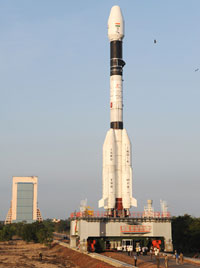Indigenous cryogenic engine not responsible for failure: ISRO
19 Apr 2010
Kochi: Senior Indian Space Research Organisation (ISRO) scientists, reviewing the reasons for the failure of the GSLV-D3 mission, which was primarily meant to test the indigenously developed cryogenic upper stage of the rocket, have determined that contrary to the initial impression it was a malfunction of another part, and not a failure of the cryogenic stage to ignite, that led to the mission going awry.
 |
| GSLV-D3 ready for launch |
A preliminary study of flight data by the scientists has determined that the cryogenic stage did indeed ignite but failed to function thereafter as a fuel turbo pump that supplied fuel to the cryogenic engine stopped working just a second after ignition.
The two-day review meet was chaired by ISRO chairman Dr K Radhakrishnan.
According to reports, scientist say that data reveals that combustion did indeed take place as the rocket's acceleration increased for a second before it began to drift off the designated flight path. Scientists surmise that the turbine that powered the fuel turbo pump had somehow failed.
It is being given to understand that ISRO will now constitute a 'Failure Analysis Committee' to pinpoint exact reasons for the failure and submit its report by next month-end.
Dr Radhakrishnan is also due to brief prime minister Manmohan Singh on Tuesday on the mission.



















